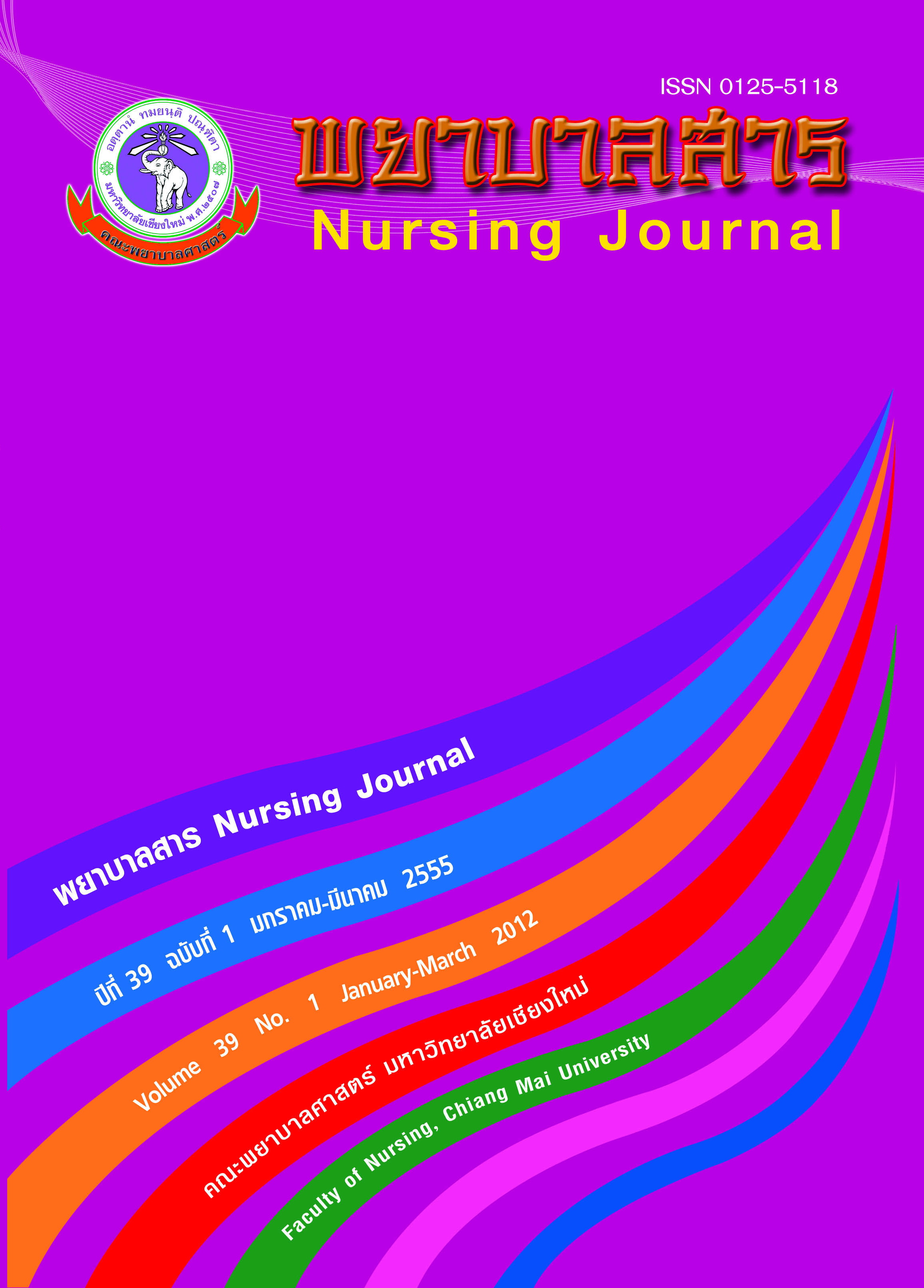ผลของโปรแกรมการส่งเสริมสมรรถนะแห่งตน และการสนับสนุนทางสังคมต่อพฤติกรรม การควบคุมโรค และระดับครีเอตินินในเลือดในผู้สูงอายุโรคไตเรื้อรังระยะสุดท้ายที่รับการฟอกเลือดด้วยเครื่องไตเทียม
Abstract
บทคัดย่อ
โรคไตเรื้อรังระยะสุดท้ายเป็นปัญหาสาธารณสุขที่สำคัญทั่วโลก ก่อให้เกิดภาวะแทรกซ้อนและ ผลกระทบต่อสุขภาพของผู้ป่วย การฟอกเลือดด้วยเครื่องไตเทียม ร่วมกับการมีพฤติกรรมการควบคุม โรคที่เหมาะสมจะทำให้ผู้สูงอายุโรคไตเรื้อรังระยะสุดท้ายมีคุณภาพชีวิตที่ดี การวิจัยเชิงทดลอง ครั้งนี้มีวัตถุประสงค์เพื่อศึกษาผลของโปรแกรมการส่งเสริมสมรรถนะแห่งตนและการสนับสนุน ทางสังคมต่อพฤติกรรมการควบคุมโรคและระดับครีเอตินินในเลือดในผู้สูงอายุโรคไตเรื้อรังระยะ สุดท้ายที่รับการฟอกเลือดด้วยเครื่องไตเทียม กลุ่มตัวอย่างเป็นผู้สูงอายุที่รับการฟอกเลือดที่หน่วย ไตเทียมเฉลิมพระเกียรติ 6 รอบพระชนมพรรษา โรงพยาบาลนราธิวาสราชนครินทร์ จังหวัดนราธิวาส ระหว่างเดือนมกราคมถึงเดือนมีนาคม พ.ศ. 2554 จำนวน 24 ราย สุ่มเข้ากลุ่มทดลองและ กลุ่มควบคุมกลุ่มละ 12 ราย โดยให้ทั้ง 2 กลุ่ม มีความคล้ายคลึงกันในด้านเพศ อายุ ระยะเวลา การฟอกเลือดด้วยเครื่องไตเทียม คะแนนพฤติกรรมการควบคุมโรค กลุ่มทดลองได้รับการส่งเสริม สมรรถนะแห่งตนจากผู้วิจัยและได้รับการสนับสนุนทางสังคมจากสมาชิกครอบครัว ส่วนกลุ่มควบคุม ได้รับการดูแลตามปกติเครื่องมือที่ใช้ในการวิจัยประกอบด้วยโปรแกรมการส่งเสริมสมรรถนะแห่งตน และการสนับสนุนทางสังคม วีดีทัศน์การเสนอตัวแบบสัญลักษณ์เกี่ยวกับพฤติกรรมการควบคุมโรค คู่มือสำหรับการปฏิบัติพฤติกรรมการควบคุมโรคพฤติกรรมการควบคุมโรค คู่มือสำหรับสมาชิก ครอบครัวในการสนับสนุนการปฏิบัติพฤติกรรมการควบคุมโรคแก่ผู้สูงอายุที่รับการฟอกเลือดด้วย เครื่องไตเทียมและเครื่องมือการเก็บรวบรวมข้อมูล ได้แก่ แบบบันทึกข้อมูลส่วนบุคคลของกลุ่มตัวอย่าง และสมาชิกครอบครัว และแบบวัดพฤติกรรมการควบคุมโรค วิเคราะห์ข้อมูลโดยใช้สถิติเชิงพรรณา และสถิติทดสอบค่าที
ผลการวิจัย พบว่า
ค่าเฉลี่ยคะแนนพฤติกรรมการควบคุมโรคของกลุ่มทดลองหลังเข้าร่วมโปรแกรมสูงกว่ากลุ่มควบคุม และภายหลังเข้าร่วมโปรแกรมกลุ่มทดลองมีค่าเฉลี่ยคะแนนพฤติกรรมการควบคุมโรคสูงกว่าก่อนเข้าร่วม โปรแกรมอย่างมีนัยสำคัญทางสถิติที่ระดับ 0.05 แต่ค่าเฉลี่ยระดับครีเอตินินในเลือดของกลุ่มทดลองหลัง ได้รับโปรแกรมตํ่ากว่ากลุ่มควบคุมอย่างไม่มีนัยสำคัญทางสถิติ และหลังเข้าร่วมโปรแกรมค่าเฉลี่ยครีเอตินิน ในเลือดในกลุ่มทดลองสูงกว่าก่อนได้รับอย่างไม่มีนัยสำคัญทางสถิติ
ผลการศึกษาครั้งนี้แสดงให้เห็นถึงประสิทธิผลของโปรแกรมการส่งเสริมสมรรถนะแห่งตนและการ สนับสนุนทางสังคมถึงแม้จะไม่สามารถลดระดับครีเอตินินในเลือด แต่สามารถเพิ่มพฤติกรรมการควบคุมโรค ในผู้สูงอายุโรคไตเรื้อรังระยะสุดท้ายที่รับการฟอกเลือดด้วยเครื่องไตเทียมได้ ซึ่งบุคลากรทางการพยาบาล สามารถนำไปใช้ส่งเสริมพฤติกรรมการควบคุมโรคของผู้สูงอายุกลุ่มนี้ได้
Abstract
End stage renal disease (ESRD) is a worldwide public health problem, which leads to complications and impacts patients’ health. Hemodialysis and appropriate disease control behaviors will improve quality of life of elderly with end stage renal disease. The purpose of this experimental research was to examine the effects of the Self-efficacy and Social Support Promoting Program on disease control behaviors and serum creatinine level among the elderly with end stage renal disease, receiving hemodialysis. The subject were 24 elderly with hemodialysis, attended the Hemodialysis unit of Naradhiwasrajanagarindra hospital, Narathiwat province during January to March 2011. The subjects were randomly assigned equally into experimental and control groups considering the similarity in sex, age, time to hemodialysis and disease control behaviors score. The experimental group participated in the Self-efficacy Promoting Program provided by the researcher and received social support from family members, while the control group received routine nursing care. The instruments used in this study consisted of the Self-efficacy and Social Support Promoting Program, a video showing disease control behaviors role modeling, the Self Care Manual for the elderly, and the Social Support for Disease Control Behaviors Manual for the family members. The assessment tools consisted of the Demographic Data Recording Form and Disease Control Behaviors Scale. Data were analyzed using descriptive statistics and t-test.
The results of study
Disease control behaviors mean scores of the elderly with hemodialysis who participated in the program were statistically significantly higher than those of the control group (p < 0.05) and the disease control behaviors mean scores of the elderly with hemodialysis after participating in the program were statistically significantly higher than before (p < 0.05). Serum creatinine level of the elderly with hemodialysis who participated in the program was not significantly lower than those of the control group and serum creatinine level of the elderly with hemodialysis after participating in the program was not significantly higher than before.
The study findings indicate the effectiveness of Self-efficacy and Social Support Promoting Program. Although serum creatinine level cannot be decreased, but disease control behaviors in the elderly with end stage renal disease who’s receiving hemodialysis could be enhanced. Nurses can use this program to promote disease control behaviors in this population group.
Downloads
How to Cite
Issue
Section
License
บทความที่ได้รับการตีพิมพ์เป็นลิขสิทธิ์ของวารสารพยาบาลสาร
ข้อความที่ปรากฏในบทความแต่ละเรื่องในวารสารวิชาการเล่มนี้เป็นความคิดเห็นส่วนตัวของผู้เขียนแต่ละท่านไม่เกี่ยวข้องกับมหาวิทยาลัยเชียงใหม่ และคณาจารย์ท่านอื่นๆในมหาวิทยาลัยฯ แต่อย่างใด ความรับผิดชอบองค์ประกอบทั้งหมดของบทความแต่ละเรื่องเป็นของผู้เขียนแต่ละท่าน หากมีความผิดพลาดใด ๆ ผู้เขียนแต่ละท่านจะรับผิดชอบบทความของตนเองแต่ผู้เดียว






